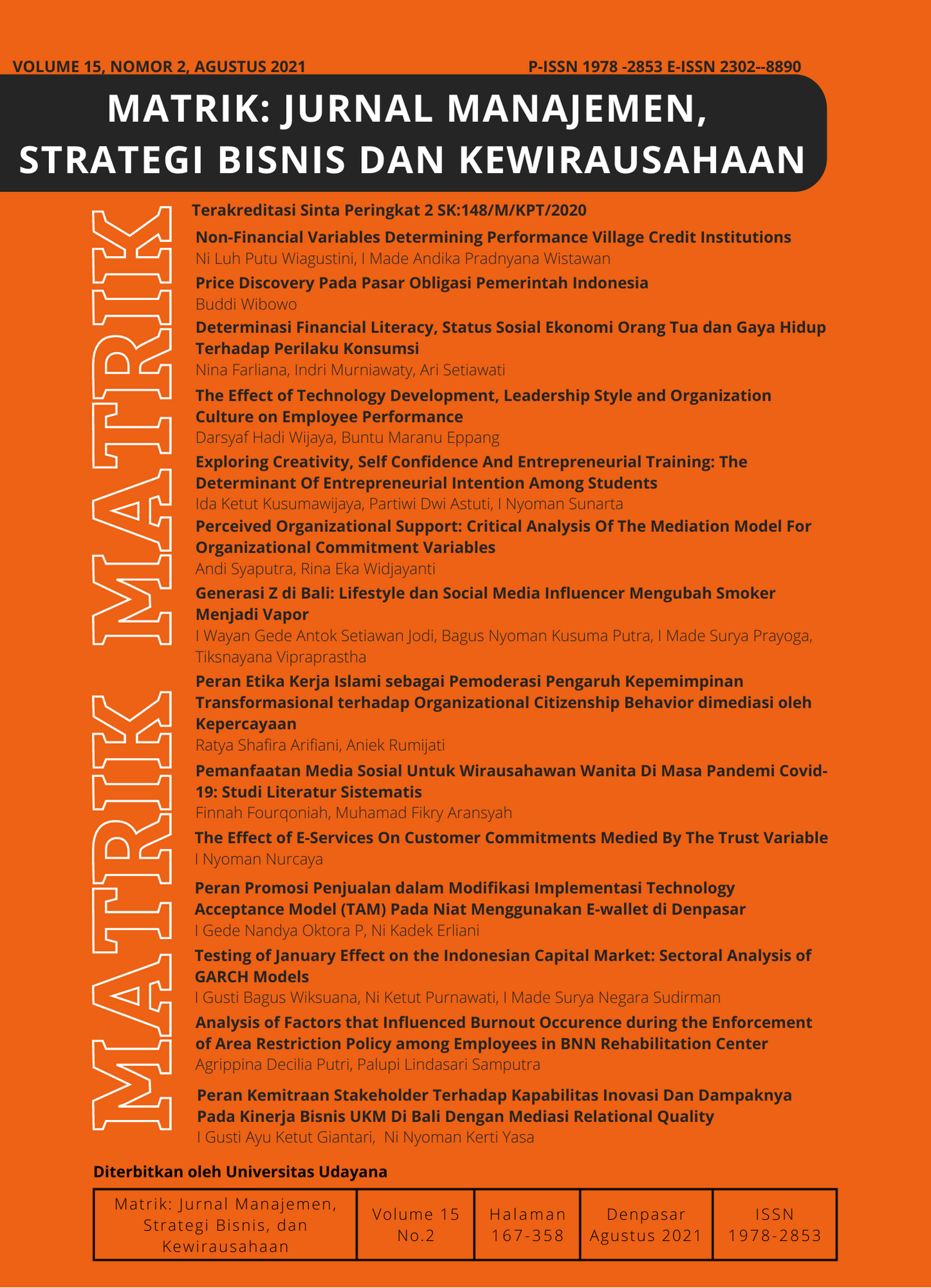Exploring Creativity, Self Confidence And Entrepreneurial Training: The Determinant Of Entrepreneurial Intention Among Students
Abstract
ABSTRACT:
This study aims to analyze the determinants of entrepreneurial intention by examining the effects of creativity, self-confidence, entrepreneurial training, subjective norms, entrepreneurial attitude and perceived control. This research was conducted on student majoring in business at private university in Bali with a population of 7,246 people. The sample is 379 and data is collected using a questionnaire that returns 279 with a response rate of 62.56%. Testing the research model using PLS-SEM with WarpPLS 7.0. The results show that creativity, self-confidence can significantly affect entrepreneurial attitude; entrepreneurial training can significantly affect perceived control; subjective norms, entrepreneurial attitude and perceived control can significantly influence entrepreneurial intention. This study finds the role of creativity, self-confidence and entrepreneurial training as determinants of entrepreneurial intention among business students in Bali.
Downloads
References
Antonio, T., Lanawati, S., Wiriana, T. A., & Christina, L. (2014). Correlations Creativity, Intelligence, Personality, and Entrepreneurship Achievement. Procedia - Social and Behavioral Sciences, 115(Iicies 2013), 251–257. https://doi.org/10.1016/j.sbspro.2014.02.433
Bektaş, F. (2011) ‘Entrepenuerial Intentions Of Turkish’, International Journal of Arts & Sciences, 4(8), pp. 167–181.
Bujor, A. and Avasilcai, S. (2016) ‘The Creative Entrepreneur : a Framework of Analysis’, Procedia - Social and Behavioral Sciences. Elsevier B.V., 221, pp. 21–28. doi: 10.1016/j.sbspro.2016.05.086.
Bux, S. R. and Honglin, Y. (2015) ‘Analyzing the Impact of The Psychological Characteristics on Entrepreneurial Intentions Among University Students’, Advances in Economics and Business, 3(6), pp. 215–224. doi: 10.13189/aeb.2015.030603.
Che, S., Mistima, S. and Mohd, N. (2015) ‘Identifying Factors that Affecting the Entrepreneurial Intention among Engineering Technology Students’, Procedia - Social and Behavioral Sciences. Elsevier B.V., 211(September), pp. 1016–1022. doi: 10.1016/j.sbspro.2015.11.135.
Chen, S., Shen, Y., Naznin, P., Wang, H., & Wu, S. (2014). Types Of Poverty And Entrepeneurial Intention In Bangladesh. Social Behavioral and Personality, 42(5), 857–868.
Chin, W. W. (1998) ‘Commentary: Issues and opinion on structural equation modeling’, MIS Quarterly: Management Information Systems, 22(1), pp. vii–xvi.
Dileo, I. T. G. P. F. L. (2016) ‘Empirical Evidence On Entrepeneurial Intentions In Some Balkan Countries’, Cogito – Revista De Cercetare Stiintifica Pluridisciplinara, 8(4), pp. 79–96.
Dinis, A., do Paço, A., Ferreira, J., Raposo, M., & Rodrigues, R. G. (2013). Psychological characteristics and entrepreneurial intentions among secondary students. Education + Training, 55(89), 763–780. https://doi.org/10.1108/ET-06-2013-0085
Draghici, A., Tiberiu, C. and Tamasila, M. (2014) ‘Entrepreneurial attitude as knowledge asset : its impact on the entrepreneurial activity in Europe’, Procedia - Social and Behavioral Sciences. Elsevier B.V., 109, pp. 205–209. doi: 10.1016/j.sbspro.2013.12.445.
Erdilek, M., Akyüz, B. and Elçi, M. (2016) ‘Effects of Family-Work Conflict , Locus of Control , Self Confidence and Extraversion Personality on Employee Work Stress’, Procedia - Social and Behavioral Sciences. Elsevier B.V., 235(October), pp. 269–280. doi: 10.1016/j.sbspro.2016.11.030.
Farrukh, M., Alzubi, Y., Shahzad, I. A., Waheed, A., & Kanwal, N. (2018). Entrepreneurial intentions: The role of personality traits in perspective of theory of planned behaviour. Asia Pacific Journal of Innovation and Entrepreneurship, 12(3), 339–414. https://doi.org/10.5367/ijei.2015.0199
Ferreira, J., Raposo, L. and Rodrigues, R. G. (2012) ‘A model of entrepreneurial intention An application of the psychological and behavioral approaches’. doi: 10.1108/14626001211250144.
Ferreras-Garcia, R., Hernández-Lara, A. B. and Serradell-López, E. (2019) ‘Entrepreneurial competences in a higher education business plan course’, Education and Training. doi: 10.1108/ET-04-2018-0090.
Fietze, S. and Boyd, B. (2017) ‘Entrepreneurial intention of Danish students: a correspondence analysis’, International Journal of Entrepreneurial Behavior & Research, 23(4). doi: http://dx.doi.org/10.1108/MRR-09-2015-0216.
Fishbein, M. and Ajzen, I. (1975) ‘Belief , Attitude , Intention , and Behavior : An Introduction to Theory and Research’, Addison-Wesley Publishing Company Inc. Menlo Park, California.
Fornell, C., & Larcker, D. F. (1981). Evaluating Structural Equation Models with Unobservable Variables and Measurement Error. Journal of Marketing Research, 18(1), 39–50.
Gedik, S., Miman, M. and Serdar, M. (2015) ‘Characteristics and Attitudes of Entrepreneurs Towards Entrepreneurship’, Procedia - Social and Behavioral Sciences 195, 195, pp. 1087–1096. doi: 10.1016/j.sbspro.2015.06.153.
Hair, J. F. J., Hult, G. T. M., Ringle, C. M., & Sarstedt, M. (2017). A Primer on Partial Least Squares Structural Equation Modeling (PLS-SEM). Sage Publication, California, 390. https://doi.org/10.1007/s10995-012-1023-x [doi]
Hmieleski, K. M. and Corbett, A. C. (2006) ‘Proclivity for Improvisation as a Predictor of Entrepreneurial Intentions’, Journal of Small Business Management, 44(1), p. 45.
Hu, R., & Ye, Y. (2017). Do Entrepreneurial Alertness And Self Efficacy Predict Chinese Sports Major Students Entrepreneurial Intention. Social Behavioral and Personality, 45(7), 1187–1196.
Ismail, V. Y. and Zain, E. (2015) ‘The Portrait of Entrepreneurial Competence on Student Entrepreneurs’, Procedia - Social and Behavioral Sciences. Elsevier B.V., 169(August 2014), pp. 178–188. doi: 10.1016/j.sbspro.2015.01.300.
Jakopec, A., Krecar, I. M., & Susanj, Z. (2013). Prdictor of Entrepreneurial Intentions of Students of Economics. Studia Psychologica, 55(4), 289–298.
Joseph, I. (2017) ‘Factors Influencing International Student Entrepreneurial Intention in Malaysia’, American Journal of Industrial and Business Management, 07(04), pp. 424–428. doi: 10.4236/ajibm.2017.74030.
Karabulut, A. T. (2016) ‘Personality Traits on Entrepreneurial Intention’, Procedia - Social and Behavioral Sciences, 229, pp. 12–21. doi: 10.1016/j.sbspro.2016.07.109.
Khuong, M. N. and An, N. H. (2016) ‘The Factors Affecting Entrepreneurial Intention of the Students of Vietnam National University — A Mediation Analysis of Perception toward Entrepreneurship’, Journal of Economics, Business and Management, 4(2), pp. 104–111. doi: 10.7763/JOEBM.2016.V4.375.
Kirkwood, J. (2009) ‘Is a lack of self-confidence hindering women entrepreneurs?’, International Journal of Gender and Entrepreneurship, 1(2), pp. 118–133. doi: 10.1108/17566260910969670.
Kock, N. (2020) ‘WarpPLS User Manual Version 7.0’, ScriptWarp Systems, p. 141.
Krueger, N. F., Reilly, M. D. and Carsrud, A. L. (2000) ‘Competing Models of Entrepeneurial Intentions’, Journal of Business Venturing, 15, pp. 411–432.
Kumar, P. and Nagendra, A. (2014) ‘Due Diligence to Assess and Validate the Students Entrepreneurs and Their Business Plans – An Investors ’ Contemporary Approach’, Procedia - Social and Behavioral Sciences 195. Elsevier B.V., 11(14), pp. 737–744. doi: 10.1016/S2212-5671(14)00237-8.
Kumar, R. and Shukla, S. (2019) ‘Creativity , Proactive Personality and Entrepreneurial Intentions : Examining the Mediating Role of Entrepreneurial Self-efficacy’, Global Business Review, pp. 1–18. doi: 10.1177/0972150919844395.
Liñán, F. and Chen, Y.-W. (2009) ‘Development and Cross-Cultural Application of a Specific Instrument to Measure Entrepreneurial Intentions’, Entrepreneurship Theory And Practice, 33(3), pp. 593–617.
Liñán, F. and Chen, Y. (2006) ‘Testing the Entrepreneurial Intention Model on a two-country Sample’, Documents de treball, 06/7(November), pp. 1–37.
Liñán, F., Urbano, D. and Guerrero, M. (2011) ‘Regional variations in entrepreneurial cognitions: Start-up intentions of university students in Spain’, Entrepreneurship and Regional Development, 23(3–4), pp. 187–215. doi: 10.1080/08985620903233929.
Man, T. W. Y. (2012) ‘Developing a behaviour-centred model of entrepreneurial learning’, Journal of Small Business and Enterprise Development, 19(3), pp. 549–566. doi: 10.1108/14626001211250289.
Mcadam, M. and Cunningham, J. A. (2019) ‘Entrepreneurial Behaviour: Individual , Contextual and Microfoundational Perspectives’, Palgrave, MacMillan. Edited by M. McAdam and J. A. Cunningham. Switerland: Palgrave, MacMillan, p. 363. doi: https://doi.org/10.1007/978-3-030-04402-2.
Ministry of Education and Culture, R. of I. (2021) Higher Education Database, Ministry of Education and Culture of the Republic of Indonesia, 2021, Student Data, https://pddikti.kemdikbud.go.id/data_mahasiswa.
Miranda, F. J., Chamorro-Mera, A. and Rubio, S. (2017) ‘Academic entrepreneurship in Spanish universities: An analysis of the determinants of entrepreneurial intention’, European Research on Management and Business Economics. AEDEM, 23(2), pp. 113–122. doi: 10.1016/j.iedeen.2017.01.001.
Nihan, Y., Çak, Ö. and Bige, O. (2016) ‘Ready to Dare ? A Case Study on the Entrepreneurial Intentions of Business and Engineering Students in Turkey’, Procedia - Social and Behavioral Sciences, 229, pp. 277–288. doi: 10.1016/j.sbspro.2016.07.138.
Olugbola, S. A. (2017) ‘Exploring entrepreneurial readiness of youth and startup success components : Entrepreneurship’, Journal of Innovation & Knowledge. Journal of Innovation & Knowledge, 2, pp. 155–171.
Peng, Z., Lu, G. and Kang, H. (2012) ‘Entrepreneurial Intentions and Its Influencing Factors: A Survey of the University Students in Xi’an China’, Creative Education, 03(08), pp. 95–100. doi: 10.4236/ce.2012.38B021.
Robbins, S. P. and Judge, T. A. (2013) Organizational Behavior. 15th edn, Pearson. 15th edn. Pearson Education. doi: 10.12737/4477.
Robles, L. and Zaraga-Rodriguez, M. (2015) ‘Key Competencies for Entrepreneurship’, Procedia Economics and Finance. Elsevier B.V., 23(October 2014), pp. 828–832. doi: 10.1016/S2212-5671(15)00389-5.
Rodica, M. and Cazan, A. (2011) ‘Social and Involvement in Entrepreneurial Training and Personality’, Procedia - Social and Behavioral Sciences, 00, pp. 1251–1256. doi: 10.1016/j.sbspro.2011.10.242.
Roland, S., Zamberi, S., Mohd, L., & Yusof, M. (2012). Women Entrepreneurs : Making A change From Employment to Small and Medium Business Ownership. Procedia Economics and Finance, 4(Icsmed), 321–334. https://doi.org/10.1016/S2212-5671(12)00347-4
Sušanj, Z. A. J. Z. S. A. J. and Krečar, I. M. (2015) ‘Verifying The Model Of Prediciting Entrepeneurial Intention Among Students Of Business And Non Business Orientation’, Management, 20(2), pp. 49–70.
Thompson, J. L. (2004) ‘The facets of the entrepreneur : identifying entrepreneurial potential’, Management Decision, 42(2), pp. 243–258. doi: 10.1108/00251740410515861.
Tiwari, P., Bhat, A. K. and Tikoria, J. (2017) ‘Predictors of social entrepreneurial intention: an empirical study’, South Asian Journal of Business Studies, 6(1), pp. 53–79. doi: 10.1108/SAJBS-04-2016-0032.
Tomczak-horyń, K. and Knosala, R. (2017) ‘Evaluation of Employees ’ Creativity as a Stimulator of Company Development’, Procedia Engineering. The Author(s), 182, pp. 709–716. doi: 10.1016/j.proeng.2017.03.184.
Uddin, M. R. and Bose, T. K. (2012) ‘Determinants of Entrepreneurial Intention of Business Students in Bangladesh’, International Journal of Business and Management, 7(24). doi: 10.5539/ijbm.v7n24p128.
Usaci, D. (2015) ‘Predictors of professional entrepreneurial intention and behavior in the educational field’, Procedia - Social and Behavioral Sciences. Elsevier B.V., 187(2007), pp. 178–183. doi: 10.1016/j.sbspro.2015.03.034.
Uygun, R. and Kasimoglu, M. (2013) ‘The Emergence of Entrepreneurial Intentions in Indigenous Entrepreneurs : The Role of Personal Background on the Antecedents of Intentions’, International Journal of Business and Management, 8(5), pp. 24–40. doi: 10.5539/ijbm.v8n5p24.
Valliere, D. (2015) ‘An Effectuation Measure of Entrepreneurial Intent’, Procedia - Social and Behavioral Sciences. Elsevier B.V., 169(August 2014), pp. 131–142. doi: 10.1016/j.sbspro.2015.01.294.
Wang, W., Lu, W. and Millington, J. K. (2011) ‘Determinants of Entrepreneurial Intention among College Students in China and USA’, Journal of Global Entrepreneurship Research, Winter & Spring, 1(1), pp. 35–44. doi: 10.5430/ijhe.v3n4p106.
Yang, J. (2013) ‘The Theory Of Planned Behavior And Prediction Of Entrepeneurial Intention Among Chinese Undegraduates’, Social Behavioral and Personality, 41(71002112), pp. 367–376. Available at: http://dx.doi.org/10.2224/sbp.2013.41.3.367.
Yatribi, T. (2016) ‘Application of Krueger ’ s Model in Explaining Entrepreneurial Intentions among Employees in’, International Journal of Human Resource Studies, 6(2), pp. 38–51. doi: 10.5296/ijhrs.v6i2.9259.
Yurtkoru, E. S. and Seray, B. (2014) ‘Willingness to take risk and entrepreneurial intention of university students : An empirical study comparing private and state universities’, Procedia - Social and Behavioral Sciences, 150, pp. 834–840. doi: 10.1016/j.sbspro.2014.09.092.
Zampetakis, L. A., Kafetsios, K., Bouranta, N., Dewett, T., & Moustakis, V. S. (2008). On the relationship between emotional intelligence and entrepreneurial attitudes and intentions. International Journal of Entrepreneurial Behaviour & Research, 15(6), 595–618. https://doi.org/10.1108/13552550910995452
 This work is licensed under a Creative Commons Attribution-ShareAlike 4.0 International License.
This work is licensed under a Creative Commons Attribution-ShareAlike 4.0 International License.

















